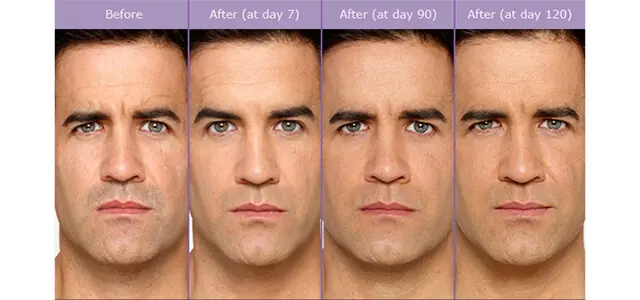

Believe it or not, botulinum toxin, or Botox® Cosmetic, as it is commonly known, is a naturally occurring protein. Although these naturally occurring proteins are widely known as toxins, they are better and more accurately described as neuromodulators. Botulinum neuromodulator is produced by the bacterium called Clostridium botulinum. When used medically, only the neuromodulator molecule is injected, never the bacteria itself.

Once injected, the botulinum neuromodulator exerts its effect by blocking the action of a signaling molecule, let’s call it “A.” (for acetylcholine). Molecule “A” normally stimulates a muscle to move, but since it is never released, the muscle can’t move. Over time, the body naturally breaks down the protein. This may sound scary, but the process of how botulinum toxin works has been heavily studied and published in medical scientific literature. When used appropriately, Botox® Cosmetic injections are quite safe.
Now that we know how Botox® Cosmetic works, what are the 5 most important things you need to know about when considering Botox® Cosmetic injections?
1. You will not stop breathing or contract botulism from your treatment.
When Botox® is used for cosmetic reasons the dosage does not come close to the amount needed to be considered a toxic dose. You would need to inject 2,800 – 3,000 units to reach a toxic level, which is 28 or 30 vials.

2. You may develop some bruising.
The only way Botox® Cosmetic can be delivered with a needle, so there is a risk of getting a bruise. However, these bruises are typically very small and can be easily covered with makeup.
3. You should not exercise or lie flat for up to three hours after your injection.
Botox® Cosmetic is transported as a powder and is reconstituted with sterile saline or lidocaine, a numbing medication. It is precisely placed in planned injection spots, and the goal is for the Botox® to stay in these areas.
You should also avoid massaging the injected areas after treatment. This may introduce a very small risk of migration of the protein to unintended areas.
Although we don’t restrict patient’s activities after Botox® Cosmetic injections, it’s best not to exercise or lie flat in the immediate hours after treatment. Exercising or lying flat can change the blood flow to these areas and may cause a migration of the molecule.
4. You can wear makeup immediately after your treatment
There is very little risk of infection after a Botox® Cosmetic injection. We actually encourage the use of makeup after a Botox® treatment, as there can a little redness after a treatment. We see many women and men over their lunch hours and our team of in-house makeup artists always help provide a little camouflage.
5. There is a risk of developing a droopy eyelid.
In experienced hands, there is a very small risk of developing a drooping eyelid, and only occurs when the Botox® neuromodulator migrates to the eyelid muscles. However, this tiny risk is much higher if an inexperienced injector does the treatment. Patients are also concerned about the risks of getting a drooping eyebrow. This risk is easily avoided by seeing a Board-Certified physician who has been trained appropriately and does a personalized evaluation of your facial structure. Our award-winning team always keeps your heredity and individual goals in mind.
No matter who you see for your Botox® Cosmetic injections please remember you have the right to have all of your questions answered. You should always feel comfortable with your injector. If you are looking to consult with a Board-Certified plastic surgeon with an expertise in Botox® and filler injections, contact our team today at Oasis Medi-Spa and Facial, Plastic, Reconstructive and Laser Surgery.
To schedule a consultation please contact our Concierge Patient Coordinators at (845) 454-8025 or email us at info@NYfaceMD.com. We proudly serve New York, the Hudson Valley, Westchester County and the tri-state area.